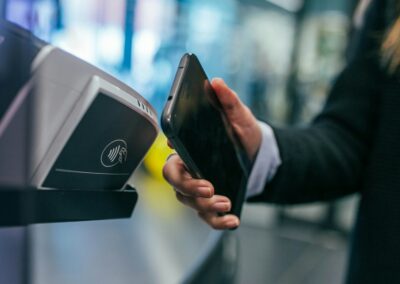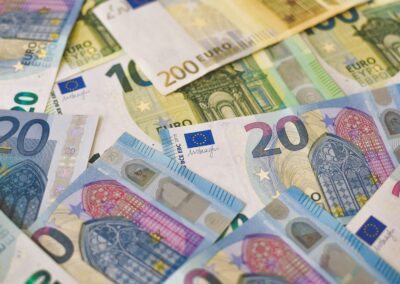Transforming Financial Transactions with Smart Contracts
Understanding Smart Contracts
Smart contracts are self-executing contracts with the terms of the agreement directly written into code, enabling automated and trustless financial transactions. These digital contracts leverage blockchain technology to ensure that transactions are executed automatically when predefined conditions are met, without the need for intermediaries. In Saudi Arabia and the UAE, the adoption of smart contracts is gaining momentum, driven by the need for greater efficiency, transparency, and security in financial transactions.
In Riyadh, financial institutions are exploring the potential of smart contracts to streamline various processes, from loan approvals to trade finance. By embedding the terms of an agreement into a blockchain, smart contracts eliminate the risk of manual errors and fraud, ensuring that all parties adhere to the agreed terms. This automated approach not only reduces operational costs but also enhances the speed and reliability of transactions.
Similarly, Dubai has positioned itself as a leader in blockchain innovation through initiatives like the Dubai Blockchain Strategy. The strategy aims to leverage smart contracts to improve government services and enhance economic efficiency. For instance, the Dubai Land Department has implemented smart contracts for property transactions, reducing the time and paperwork involved in buying and selling real estate. This application of smart contracts highlights their potential to revolutionize traditional financial systems and drive digital transformation.
Enhancing Security and Trust in Transactions
The implementation of smart contracts in financial transactions significantly enhances security and trust, addressing some of the key challenges faced by traditional financial systems. One of the primary benefits of smart contracts is their ability to provide a transparent and tamper-proof record of all transactions. Since smart contracts are built on blockchain technology, every transaction is recorded on a distributed ledger that is accessible to all parties involved. This transparency ensures that all participants have a clear and immutable record of the contract’s execution.
In Saudi Arabia, the adoption of smart contracts is seen as a way to enhance the security of financial transactions and build trust among investors. By automating the execution of contracts and eliminating the need for intermediaries, smart contracts reduce the risk of fraud and manipulation. This is particularly important in sectors such as trade finance and supply chain management, where trust and transparency are critical.
Dubai has also recognized the security benefits of smart contracts and is actively promoting their use in various industries. For example, the Dubai Financial Services Authority (DFSA) is exploring the use of smart contracts to enhance regulatory compliance and oversight. By automating compliance checks and reporting, smart contracts can help financial institutions in Dubai adhere to regulatory requirements more efficiently and accurately. This not only improves regulatory compliance but also fosters a more transparent and trustworthy financial ecosystem.
Driving Business Success through Innovation
Smart contracts are driving business success in Saudi Arabia and the UAE by enabling innovative financial solutions and enhancing operational efficiency. By automating routine tasks and reducing the need for manual intervention, smart contracts allow businesses to focus on strategic initiatives and value-added activities. This leads to increased productivity and cost savings, which are essential for maintaining a competitive edge in today’s dynamic business environment.
In Riyadh, many startups and established businesses are leveraging smart contracts to create new business models and revenue streams. For example, fintech companies are using smart contracts to develop decentralized finance (DeFi) platforms that offer a range of financial services, such as lending, borrowing, and trading, without the need for traditional intermediaries. These DeFi platforms democratize access to financial services and provide new opportunities for wealth generation and investment.
Dubai is also at the forefront of smart contract innovation, with numerous projects aimed at enhancing business efficiency and customer experience. The Dubai International Financial Centre (DIFC) is actively supporting the development of smart contract-based solutions through its fintech accelerator programs. By fostering a collaborative ecosystem of innovators and financial institutions, DIFC is driving the adoption of smart contracts and positioning Dubai as a global hub for fintech innovation. These efforts are instrumental in promoting business success and economic growth in the region.
Strategic Leadership and Effective Implementation
Leadership in Smart Contract Adoption
Effective leadership and strategic vision are crucial for the successful adoption of smart contracts in financial transactions. In Saudi Arabia and the UAE, leaders in both the public and private sectors have recognized the transformative potential of smart contracts and are championing their integration into the financial system. By fostering a culture of innovation and embracing new technologies, these leaders are driving digital transformation and setting the stage for long-term success.
In Riyadh, government agencies and financial institutions are working together to develop a supportive regulatory framework for smart contracts. This involves establishing clear guidelines and standards to ensure that smart contracts are implemented securely and effectively. The Saudi Arabian Monetary Authority (SAMA) has been at the forefront of these efforts, promoting the adoption of smart contracts through pilot projects and industry collaborations. This proactive approach is essential for building confidence in smart contract technology and encouraging widespread adoption.
Dubai has also demonstrated strong leadership in the adoption of smart contracts, with initiatives led by the Dubai Future Foundation and the Smart Dubai Office. These organizations are driving the implementation of smart contracts across various sectors, from finance to real estate. By providing strategic direction and fostering collaboration among stakeholders, Dubai’s leadership is creating an ecosystem that supports innovation and growth. The success of these initiatives highlights the importance of visionary leadership in achieving digital transformation.
Project Management and Implementation Strategies
The successful implementation of smart contract projects requires robust project management and strategic planning. In Saudi Arabia and the UAE, financial institutions and technology companies are adopting best practices in project management to ensure the seamless execution of smart contract initiatives. This involves careful planning, resource allocation, and continuous monitoring to achieve desired outcomes.
In Riyadh, banks and fintech companies are employing agile project management methodologies to drive smart contract projects. This approach allows for greater flexibility and adaptability, enabling project teams to respond quickly to changing requirements and challenges. By fostering collaboration and communication among team members, agile methodologies help ensure that smart contract projects are delivered on time and within budget.
Dubai has also seen the implementation of numerous smart contract projects across various sectors, supported by comprehensive governance frameworks. The Dubai Blockchain Strategy provides a clear roadmap for the deployment of smart contracts, ensuring alignment with broader economic and development goals. Effective project management is key to the success of these initiatives, ensuring that projects are executed efficiently and deliver tangible benefits. By leveraging advanced project management tools and technologies, Dubai is setting a benchmark for smart contract implementation.
Conclusion
In conclusion, smart contracts are revolutionizing financial transactions in Saudi Arabia and the UAE by offering automated, secure, and transparent solutions. The strategic leadership and robust project management practices in Riyadh and Dubai are driving the successful adoption of smart contracts, setting new standards for efficiency and innovation in the financial sector. As smart contracts continue to evolve, their impact on the financial landscape will only grow, offering new opportunities for business success and economic growth. For business executives, mid-level managers, and entrepreneurs, embracing smart contract technology is essential for staying competitive and achieving long-term success in the digital age.
#smartcontracts #financialtechnology #SaudiArabia #UAE #Riyadh #Dubai #blockchain #automatedtransactions #businesssuccess #leadership #managementskills #projectmanagement
























